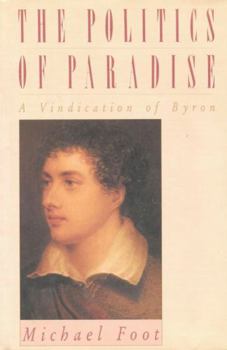Politics of Paradise
1988 Cornelia & Michael Bessie Book (Harper & Row Publishers) hardcover. ISBN: 0060390913. Author Michael Foot presents Byron as a revolutionary poet who, though unstable in his love-life, never... This description may be from another edition of this product.
Format:Hardcover
Language:English
ISBN:0060390913
ISBN13:9780060390914
Release Date:January 1989
Publisher:HarperCollins Publishers
Weight:1.80 lbs.
Related Subjects
PoetryCustomer Reviews
1 rating
Poetry and Politics Converge in this Biographical Study
Published by Thriftbooks.com User , 20 years ago
Michael Foot is a liberal English politician respected for his wide literary knowledge. In The Politics of Paradise, a Vindication of Byron, he contends that Lord Byron, chastised by his contemporaries for his scandalous personal behavior and his unrelenting antagonism to religion, has been unfairly judged by history. Making extensive use of Byron's letters and poetry, Foot argues that Byron's commitment to the principles of liberty as espoused in the French Revolution never wavered. Foot deliberately avoids much discussion of Byron's notorious love affairs, his alleged incest with his sister Augusta, and his disastrous marriage and separation from Annabella Milbanke. Foot is more interested in the way Byron continued to weave his political thinking into his poetry, despite all the distractions resulting from his notoriety. As did many English liberals, Byron enthusiastically supported the French revolution, and Napoleon's rise to power. Byron eventually accepted that Napoleon had betrayed the French revolution and later wrote of Napoleon's defeat: "so perish all, who would men by man enthral". However, Byron always insisted that the misdeeds of the Revolution should not condemn the Revolution itself. Foot devotes the lengthy first chapter to a liberal contemporary of Byron, the remarkable critic William Hazlitt. Foot begins by saying of himself: "William Hazlitt was my guide. No would-be reader and writer, no democratic socialist could wish for a better one." Nonetheless, the influential Hazlitt was a severe critic of Lord Byron. He accused Byron of a preposterous liberalism and affectation, and of being a liberal that had maintained his aristocratic privileges of peerage. Michael Foot cogently addresses Hazzlitt's criticisms, providing what appears to be a solid, convincing vindication of Byron. And yet, midway through The Politics of Paradise, I began to question whether Foot's narrow focus on Byron's political thought was perhaps too one-dimensional. Were the selections from Byron's extensive poetry and letters too selective? Was the complex and contradictory Lord Byron actually so steadfast in his political beliefs? Did Byron's contemporaries, including other poets, really misjudge his character to such a large degree? I do not have satisfactory answers to my questions. Michael Foot may indeed have provided what will be considered a lasting vindication of Lord Byron. I suspect, however, that the prudent reader would benefit from also examining other reviews and characterizations of Lord Byron. Regardless, thanks to Michael Foot, I will now approach Byron's poetry and political thought with a deeper insight and understanding.






